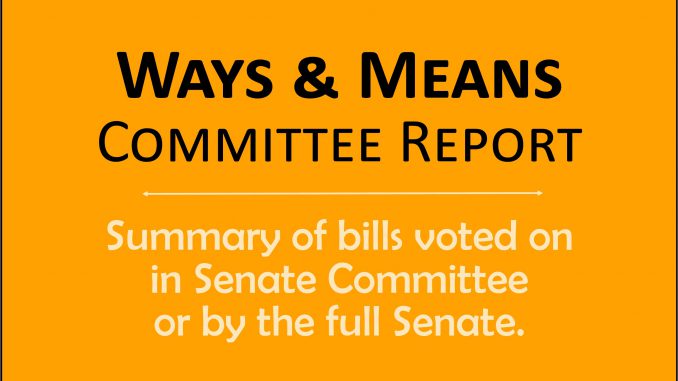
On this page
COMMITTEE ACTION:
SF 590 – Community land banks
SF 590 creates a new section in Iowa Code to establish local government land banks. Land banks are a tool to rehabilitate blighted, vacant and abandoned properties into productive use. Ultimately, the bill will create a strong funding base for affordable housing and community economic development. The land banks can be used by a community or a group of communities to address and rehabilitate dilapidated and under-developed neighborhoods. This legislation is supported by local governments, councils of governments, housing advocates and developers as tool to redevelop properties that private developers have been reluctant to invest in.
[2/23: Short form (Excused: Zaun]
SSB 3130 – Utility replacement taxes on wind energy conversion property
SSB 3130 makes a number of updates and clarifications for taxing wind energy conversion property by local governments and under the utility replacement tax. The utility replacement tax is what replaced the state property tax on utilities. However, local governments also can establish a special valuation and assessment of wind energy property located in their county, apart from the utility replacement tax.
Under the bill, wind energy conversion property that had been locally assessed under the special wind energy property tax assessment will transition to the utility replacement tax following the repeal of a local ordinance that adopted the special assessment and the end of the original 19-year assessment period for the property. The bill also clarifies that the maintenance, refurbishment or “repowering” of wind energy property is not grounds for an extension to the 19-year special assessment period. “Repowering” is defined as removing and replacing components of the wind energy property. Additionally, the bill clarifies that the collector substation, where energy is collected from multiple electricity generation sources, is considered part of the wind energy conversion property and is subject to the utility replacement tax.
The bill was proposed by the utility replacement tax task force, which includes members from local governments, utilities, state agencies and utility customers. They are charged with reviewing issues concerning the utility replacement tax and making recommendations to the Legislature that will provide tax neutrality for local governments, utilities, taxpayers and energy consumers.
The committee adopted an amendment that will provide a firm timeline for determining the net acquisition cost of wind energy conversion property. There will be no further adjustments to the net acquisition cost of the property after the third year the property is assessed, absent a clerical error.
[2/23: Short form (Excused: Zaun]
SSB 3063 – Department of Revenue sales tax administration
SSB 3063 is a Department of Revenue proposal to streamline the administration of sales taxes and motor fuel taxes.
- Sales and Use tax filings – This would combine sales and use tax filings onto the same return, eliminating the need for retailers to file separate returns. The bill also will combine sales and use tax permits into a single permit.
- The bill establishes a new structure for determining the frequency for a business to file sales and use tax returns. Returns will be filed monthly or annually, with monthly returns filed electronically, though a taxpayer can file for an exemption from this requirement.
| Current Structure | Proposed Structure |
| Annually: < $120 tax due a year | $1,200 tax due a year |
| Quarterly: $121 – $5,999 a year | |
| Monthly: $6,001-$59,999 | >$1,200 tax due a year |
| Semimonthly: > $60,000 |
- LOST/SAVE distributions – This will allow IDR to distribute local option sales taxes (LOST) and Secure an Advanced Vision for Education (SAVE) funds to local governments or school boards, respectively, based on actual receipts instead of estimates. This eliminates the need for adjustments based on actual collections, which requires an additional disbursement to the local government/school district or a refund to the state for an overpayment.
- Certified Service Providers – Liability for sales taxes owed – This will extend the liability for sales taxes owed to certified service providers for online marketplaces. This liability will allow the department to better enforce the collection of sales taxes for online transactions.
- Cancellation of sales, fuel and withholding permits – This would allow the department to cancel a permit that is no longer in use. The department must first verify that the permit is no longer being used by the permit holder.
- Deadlines to claim sales tax refunds – This clarifies when an application for a sales tax refund must be made in connection with an incentive agreement entered into by the Iowa Economic Development Authority and a company.
- Penalty for failure to file a motor fuel retailer report – This establishes a $100 fine for failure to file a motor fuel retailer annual report. This report is necessary to determine the fuel tax differential for certain renewable fuel blends.
- Motor fuel tax modifications – This division of the bill will be stricken by an amendment.
The committee adopted an amendment to remove the division of the bill regrading motor fuel taxes because of unforeseen complications with the international fuel tax agreement. The amendment also requires the department to provide each school district with an estimate of SAVE moneys the district will receive in the current school year. This addresses an issue for local districts because the current estimated payments were useful for bond agreements backed by SAVE funds.
[2/23: Short form (Excused: Zaun]
HF 419 — Driver’s license station convenience fee
HF 419 allows counties to collect a $10 fee for issuing and renewing driver’s licenses and nonoperator’s identification cards to those who reside outside the county.
[2/23: 12-4 (No: Bolkcom, Petersen, Quirmbach, T. Taylor; Excused: Zaun)]
